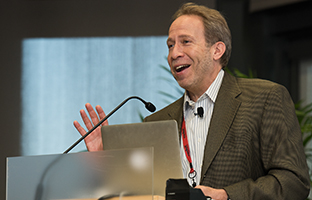Decoding Personal Relevance with Neuroscience
We are at a fascinating inflection point in our understanding of human brain function and dysfunction. In the context of the social brain, there is increasing concern that human-technology interaction may be rapidly and broadly replacing in-person, human-human interaction. There are likely to be many reasons for this phenomenon, including the fact that human-technology interaction may be more straightforward and less demanding relative to the communicative and social complexities contained in live human-human interactions. In the first part of this talk, I will describe our research designed to improve understanding of communicative and social complexities in human social interaction with the goal of providing a more complete and nuanced background for understanding human-human interaction. In the second part of the talk I will briefly describe technology-enhanced advances in personalized brain medicine that hold promise for revolutionizing our approach to common (and often devastating) brain disorders such as autism, learning disabilities and dementia.
 Allan Reiss obtained his BA in Psychobiology from Swarthmore College, and MD from George Washington University. He received his clinical and research training at University of Colorado, Children’s National Medical Center and Stanford University. He was Professor of Psychiatry, Neurology, and Pediatrics at Johns Hopkins University before coming to Stanford in 1997 where he is the Robbins Professor of Psychiatry, Radiology and Pediatrics. Dr. Reiss uses advanced research methods to determine how biological and environmental factors affect brain structure, connectivity and function, and how this ultimately impacts cognition and behavior in persons with neuropsychiatric and neuro developmental disorders. A particularly important focus of this work is to derive explanatory models that inform the development of more effective interventions. Another focus is on the neuroscience of cognition and behavior in typically developing persons including studies of humor, creativity, territorial behavior, attachment and stress responsivity. Dr. Reiss’ laboratory and collaborations serve as a model for interdisciplinary brain sciences research. Activities in the laboratory are carried out, or facilitated by faculty and staff from psychiatry, neurology, pediatrics, psychology, neuroscience, mathematics, genetics, radiology, computer science, special education, engineering and biostatistics. Dr. Reiss has received numerous honors and awards including election to the Institute of Medicine of the National Academies of Science of the United States.
Allan Reiss obtained his BA in Psychobiology from Swarthmore College, and MD from George Washington University. He received his clinical and research training at University of Colorado, Children’s National Medical Center and Stanford University. He was Professor of Psychiatry, Neurology, and Pediatrics at Johns Hopkins University before coming to Stanford in 1997 where he is the Robbins Professor of Psychiatry, Radiology and Pediatrics. Dr. Reiss uses advanced research methods to determine how biological and environmental factors affect brain structure, connectivity and function, and how this ultimately impacts cognition and behavior in persons with neuropsychiatric and neuro developmental disorders. A particularly important focus of this work is to derive explanatory models that inform the development of more effective interventions. Another focus is on the neuroscience of cognition and behavior in typically developing persons including studies of humor, creativity, territorial behavior, attachment and stress responsivity. Dr. Reiss’ laboratory and collaborations serve as a model for interdisciplinary brain sciences research. Activities in the laboratory are carried out, or facilitated by faculty and staff from psychiatry, neurology, pediatrics, psychology, neuroscience, mathematics, genetics, radiology, computer science, special education, engineering and biostatistics. Dr. Reiss has received numerous honors and awards including election to the Institute of Medicine of the National Academies of Science of the United States.